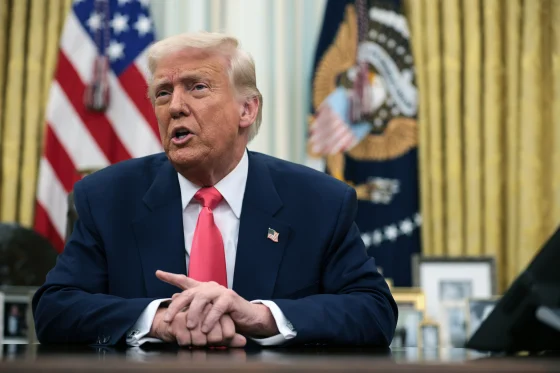U.S. President Invokes 1798 Alien Enemies Act for Deportations

In a surprising development, the U.S. President has invoked the 1798 Alien Enemies Act to accelerate the deportation of non-citizens identified as security threats. This decision has reignited discussions about immigration policy, constitutional rights, and the potential consequences for foreign nationals living in the United States.
The 1798 Alien Enemies Act, originally passed as part of the broader Alien and Sedition Acts, grants the president authority to detain and deport citizens of hostile nations during times of war or national emergency. While rarely used in modern times, its invocation has sparked concerns among civil rights advocates and legal scholars who question the scope and impact of its application in the current geopolitical climate.
Historical Context and Legal Basis
The Alien Enemies Act was enacted two centuries ago during heightened tensions between the U.S. and France. Unlike the other Alien and Sedition Acts, which were repealed or expired, this law remains in effect. It has been used sparingly throughout history, most notably during World War II, to intern and deport Japanese, German, and Italian nationals.
The President’s decision to invoke this law comes amid growing concerns over national security, with the administration citing intelligence reports indicating potential threats from foreign nationals. Officials argue that utilizing the 1798 Alien Enemies Act will enable faster deportations without the bureaucratic delays associated with standard immigration proceedings.
Government Justification and Policy Implications
White House officials have defended the move, emphasizing the need to address security threats promptly. A senior administration official said, “The U.S. President is committed to safeguarding national security, and invoking the Alien Enemies Act allows swift action against individuals who may pose a danger to our country.”
Key aspects of the policy implementation include:
- Targeted Deportations: The administration insists that only individuals with confirmed ties to hostile entities will be affected.
- Expedited Process: The Act permits removals without the lengthy legal battles typical in standard immigration cases.
- National Security Priority: Officials argue that this measure strengthens border security and deters illegal immigration.
However, critics have raised concerns about the lack of transparency in determining who qualifies as a security threat and whether the law could be misused to target specific immigrant groups unfairly.
Opposition from Civil Rights Groups and Lawmakers
The invocation of the Alien Enemies Act has faced intense criticism from civil liberties organizations, immigration advocates, and opposition lawmakers. The American Civil Liberties Union (ACLU) has described this action as an overreach of executive power, warning that it may result in racial profiling and violations of due process.
“This sets a dangerous precedent that could justify mass deportations without adequate legal protection,” said Emily Rogers, spokesperson for the ACLU. “The Alien Enemies Act is an outdated law that should not be used as a weapon against immigrant communities.”
Several members of Congress have expressed their opposition, with some advocating for legislative action to limit or repeal the Act. Senator James Reynolds, a vocal critic of the administration’s immigration policies, argued that invoking an 18th-century law in today’s context is unconstitutional. “This is a blatant attempt to bypass due process and undermine our nation’s core democratic values,” he stated.
Potential Legal Challenges and Court Battles
Legal experts anticipate a wave of lawsuits challenging the President’s use of the 1798 Alien
Enemies Act. The key legal arguments against the move include:
- Violation of Due Process: Critics argue that deporting individuals without a fair hearing infringes upon constitutional protections.
- Discriminatory Application: Civil rights groups warn that the law’s enforcement could disproportionately impact certain ethnic or national groups.
- Judicial Oversight: Lawsuits are expected to call for courts to review the scope and limits of the President’s authority under the Act.
Given the contentious nature of the policy, the issue may eventually reach the Supreme Court, where justices will have to weigh national security concerns against individual rights.
Impact on U.S. Foreign Relations
The decision to invoke the Alien Enemies Act could have significant diplomatic consequences, particularly with countries whose nationals may be affected by the policy. Foreign governments have expressed concerns about how this move could strain international relations and disrupt diplomatic ties.
International human rights organizations have also condemned the decision, arguing that it violates global norms on the treatment of migrants and asylum seekers. The United Nations High Commissioner for Refugees (UNHCR) issued a statement urging the U.S. government to reconsider the measure and uphold its commitment to humanitarian protection.
Public Reaction and Political Ramifications
Public opinion on the President’s decision remains sharply divided. Supporters argue that national security must take precedence and that the administration is acting within legal authority. Many conservatives view the move as a necessary step in strengthening immigration enforcement and protecting American citizens.
On the other hand, progressive groups and immigrant communities have condemned the policy, organizing protests and calling for legislative action to prevent future uses of the Alien Enemies Act. The controversy is expected to play a significant role in upcoming elections, with candidates on both sides using the issue to galvanize their respective voter bases.
Conclusion
The U.S. President’s use of the 1798 Alien Enemies Act for deportations has ignited a heated debate about immigration policy, national security, and civil liberties. While the administration argues that this measure is essential for protecting the country, critics caution that it may undermine constitutional rights and lead to discriminatory enforcement.
As legal battles emerge and political tensions rise, the future of this policy remains uncertain. Whether the courts will uphold or strike down the use of the Alien Enemies Act will have lasting implications for executive authority, immigration law, and the balance between security and civil rights in the United States. In the meantime, the debate over the President’s decision continues to dominate national discourse, highlighting the deep divisions in America’s approach to immigration and governance.





